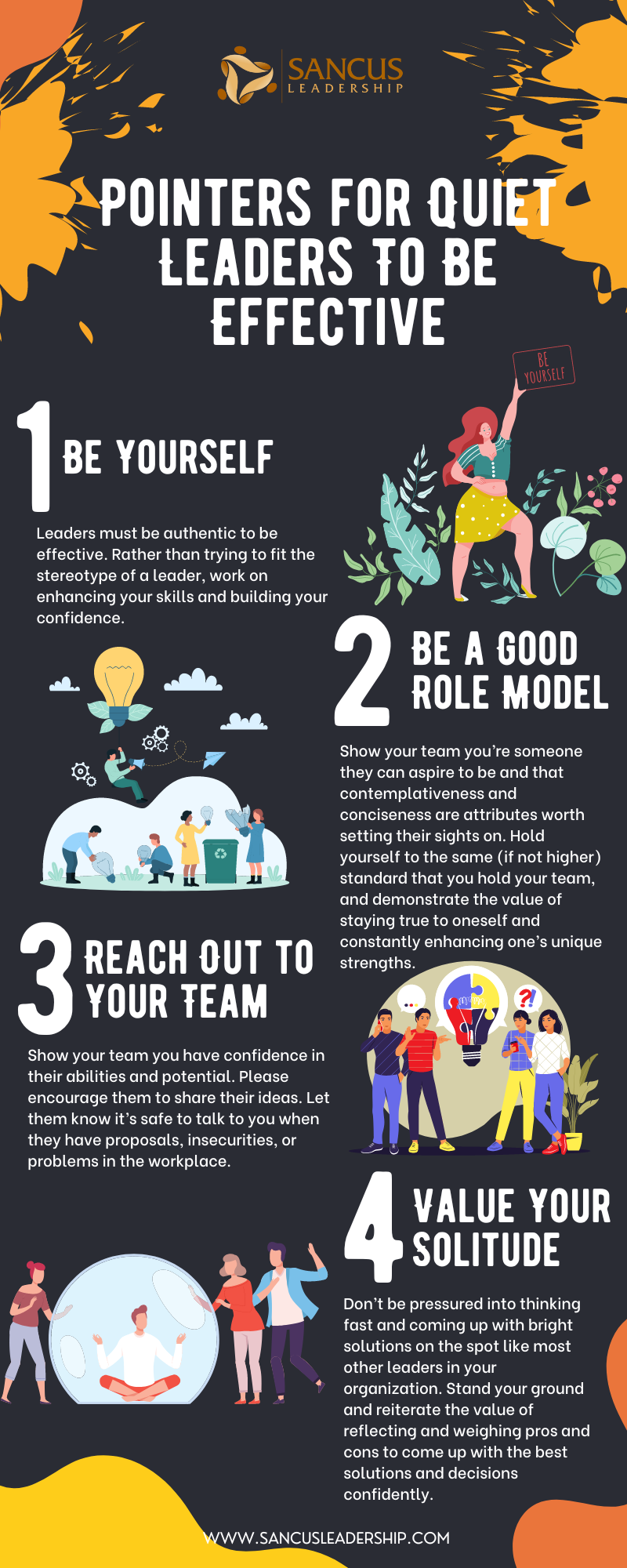Many confuse leadership with being loud and aggressive — we think outspoken and unreserved people are natural-born leaders. This rationale is outdated and unfounded because introverts have just as much leadership potential as extroverts. A business may miss opportunities if professional development is focused solely on those who outwardly exhibit leadership possibilities.
You can be quiet and a leader if you have the values and skills to manage a team effectively. Introverted leaders have an edge since they’re contemplative, critical thinkers, and great listeners. They also have good business acumen and are keen on taking calculated risks.
Stick around to discover why being quiet, ruminating, and introverted can be unique leadership assets. We will talk about how introverted leaders can positively alter an organization’s culture, bring out the best in a team, and what they can do to carve out a niche for themselves in the industry. We will also discuss the downsides of having only extroverted leaders in the organization.
What Happens if a Leader Is Quiet?

Are you one of those leaders who feel that being an introvert is an unfavorable attribute that you should work on to improve, perhaps even eradicate, from your persona? Do you feel like being quiet and contemplative prevents you from achieving your full leadership potential? Do you see your introspection as a weakness, never as a strength?
If so, you’re one of the many silent leaders who harbor doubts about their strengths and capacities in effectively leading a team. Companies also generally have misgivings about introverted leaders due to misconceptions about them.
Effects of Having Only Extrovert Leaders on Board
Here’s what can happen if all the leaders in an organization are extroverts:
- It cannot be clear. Extroverts like to talk and be the center of attention. It can get loud and chaotic, with everyone constantly vying for recognition.
- Nothing gets done. Extroverts like to talk and can go on and on for hours. Some even feel threatened when other extroverts try to steal the spotlight. This can result in impeded progress and delayed follow-throughs on proposals and commitments.
- Employees feel unseen. When extroverted leaders disregard their employees’ need to be seen and heard, they’ll likely find themselves short on staff.
Why Introverts Make Great Leaders

Having introverted leaders in an organization is like a breath of fresh air. They afford a sense of calm, are generally easier to deal with, and are usually more reliable in crises. They’re also more humble, generous, and magnanimous, making them excellent instruments for bringing out the best in employees and guiding them in reaching their full potential.
Having introverted leaders in an organization is like a breath of fresh air.
Favorable Qualities of Quiet Leaders
Here are some of the most favorable qualities generally inherent in quiet leaders:
Quiet Leaders are Reflective
They jump slowly to conclusions, preferring to mull things over before deciding. They would rather speak up only when they have something substantial to say rather than talking just for the sake of it. By diving deeper into ideas, quiet leaders can discover hidden hurdles and argument gaps, and their thoughtful reasoning helps develop sound ideas.
When dealing with their team, in-depth conversations allow them to uncover unrevealed issues that most employees would instead not share with a more outgoing leader. This leads to deeper and more meaningful interactions and relationships within the team, a significant factor in keeping top-quality workers within the business and maintaining a low employee turnover rate.
Quiet Leaders are Excellent Listeners
Quiet leaders can help you feel more empowered, seen, and heard in the organization. The impact can be most felt when the team is composed of a dynamic mix of individuals — introverts, extroverts, passive, idealists, visionaries, etc.
An introverted leader will listen to ideas and proposals thrown around, giving each team member a spotlight. Where an extroverted leader will excitedly interrupt and interject their propositions, an introvert will sit back, listen, and contemplate. Where an extroverted leader will likely do all the talking, an introvert will allow concepts to mature and bloom into feasible projects.
Quiet Leaders Take Calculated Risks
Since they are introspective and prefer mulling things over before actually embarking on anything, quiet leaders are more aware of their actions’ risks and possible consequences. A study from Northwestern University’s Kellogg School of Management headed by Camelia Kuhnen found that introverts took 28% fewer financial risks than extroverts.
Quiet Leaders Exude a Reassuring Sense of Calm
By being low-key, confident, and collected, especially in times of crisis, quiet leaders can easily rub off a sense of reassuring calm on their team. In heated situations, how they speak — calmly, slowly, mindfully, and tactfully — can reassure their team that they are in good hands and will give them tranquility and security.
| Favorable Qualities of Quiet Leaders | Description |
| Quiet Leaders are Reflective | They would rather speak up only when they have something substantial to say |
| Quiet Leaders are Excellent Listeners | Quiet leaders can help you feel more empowered, seen, and heard in the organization. |
| Quiet Leaders Take Calculated Risks | Quiet leaders are more aware of their actions’ risks and possible consequences. |
| Quiet Leaders Exude a Reassuring Sense of Calm | In heated situations, they tactfully reassure their team that they are in good hands and will give them tranquility and security. |
Successful Introvert Leaders

If you’re feeling doubtful about how successful and relevant introverted leaders can genuinely be, here are 2 of the more famous leaders known for their quiet, self-assured style in managing and leading their teams toward success:
Warren Buffet
Known for being quite reserved, shy, and socially inept, young Warren Buffet has always had a strong business acumen and was fascinated by the idea of compounding money. He soon realized that he would need to venture out of his shell to interact and influence people for his business ideas to prosper and have a shot at success.
He worked on developing his strengths, soon gained solid friendships, and earned a more positive reputation. These changes prompted him to be even more fearless with his ventures, and by his senior year in high school, was already earning quite a fortune from his pinball machine business.
Bill Gates
Known for being quiet and reserved, Microsoft’s former chairman and chief executive is known as an introvert. He stresses that deep focus, isolation, and internalization are vital factors that have helped him succeed in a world dominated by extroverts.
Pointers for Quiet Leaders To Be Effective

It is more challenging for a quiet leader to command respect and trust of their team. Still, with consistency and surefooted confidence, you’ll soon find yourself one of the most esteemed leaders in the organization.
Here are some tips:
1. Be Yourself
Remember, there’s nothing wrong with being quiet and reflective, and certainly nothing reproachable about being an introvert. You may become phony and insincere if you try to change your personality and force yourself to be outgoing and chatty. Introversion is not a problem that needs a solution — it is a strength worthy of development.
Leaders must be authentic to be effective. Rather than trying to fit the stereotype of a leader, work on enhancing your skills and building your confidence.
Leaders must be authentic to be effective.
2. Be a Good Role Model
Show your team you’re someone they can aspire to be and that contemplativeness and conciseness are attributes worth setting their sights on. Hold yourself to the same (if not higher) standard that you hold your team, and demonstrate the value of staying true to oneself and constantly enhancing one’s unique strengths.
3. Reach Out to Your Team
Show your team you have confidence in their abilities and potential. Please encourage them to share their ideas. Let them know it’s safe to talk to you when they have proposals, insecurities, or problems in the workplace.
If you’re uncomfortable about being in the limelight, consider these tips on alternative ways to reach out to your employees:
- Send emails or handwritten notes
- Schedule one-on-one meetings
- Visit them at their workstations
4. Value Your Solitude
You do not have to make fast choices all the time. Introverts are more likely to make sound decisions when they’re given time to think things through themselves. Value solitude and set time aside for contemplating essential matters at hand.

Value solitude and set time aside for contemplating essential matters at hand.
Don’t be pressured into thinking fast and coming up with bright solutions on the spot like most other leaders in your organization. Stand your ground and reiterate the value of reviewing the pros and cons to confidently develop the best solutions and decisions.
In this talk, Simon Sinek tells us how introverts may not seek the limelight, but their actions can speak volumes. Their commitment, work ethic, and dedication can inspire and motivate their team members.
When you’re ready to take the bull by the horns and plunge into the world of leadership, book a free call with us! We’ll help you find ways to leverage your strengths and reach your full potential as an introverted leader.
Final Thoughts
Successful leadership is commonly associated with outgoing, charismatic individuals with aggressive personalities. Introverts are often overlooked and wrongfully relegated to mere followers. Although there is nothing inherently wrong with being a follower, opportunities are missed when introverts are hindered from achieving their full potential as influential leaders.
Introverted leaders are quiet innovators and catalysts, going about their business with precision, calm, and a keen awareness that all words and actions reverberate throughout the organization. They provide a different take on leadership, one that can afford a more synergistic approach to teamwork.



